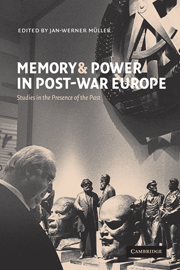Book contents
- Frontmatter
- Contents
- List of contributors
- Acknowledgements
- Introduction: the power of memory, the memory of power and the power over memory
- Part 1 Myth, memory and analogy in foreign policy
- Part 2 Memory and power in domestic affairs
- 7 The past is another country: myth and memory in post-war Europe
- 8 The emergence and legacies of divided memory: Germany and the Holocaust after 1945
- 9 Unimagined communities: the power of memory and the conflict in the former Yugoslavia
- 10 Translating memories of war and co-belligerency into politics: the Italian post-war experience
- 11 Institutionalising the past: shifting memories of nationhood in German education and immigration legislation
- 12 Trials, purges and history lessons: treating a difficult past in post-communist Europe
- Index
11 - Institutionalising the past: shifting memories of nationhood in German education and immigration legislation
Published online by Cambridge University Press: 22 September 2009
- Frontmatter
- Contents
- List of contributors
- Acknowledgements
- Introduction: the power of memory, the memory of power and the power over memory
- Part 1 Myth, memory and analogy in foreign policy
- Part 2 Memory and power in domestic affairs
- 7 The past is another country: myth and memory in post-war Europe
- 8 The emergence and legacies of divided memory: Germany and the Holocaust after 1945
- 9 Unimagined communities: the power of memory and the conflict in the former Yugoslavia
- 10 Translating memories of war and co-belligerency into politics: the Italian post-war experience
- 11 Institutionalising the past: shifting memories of nationhood in German education and immigration legislation
- 12 Trials, purges and history lessons: treating a difficult past in post-communist Europe
- Index
Summary
This chapter explores the relationship between memory and politics in the articulation of national identity in post-war Germany. We study attempts by the two post-war states to legislate and reform dominant perceptions of nationhood. More specifically, we focus on the institutionalisation of memory in two realms: first, we analyse educational policies and the ways in which they are expressed in secondary history instruction in the Federal Republic of Germany (FRG or West Germany) and the German Democratic Republic (GDR or East Germany); second, we examine the differential effects policies and perceptions about ethnic German immigrants have had on national self-understanding in West Germany since 1945.
Rather than presuppose the persistence of national identities, we explore the conditions under which nationhood has been negotiated and how distinctive memories and institutional practices became entwined at specific historical junctures. We treat the nation as a contested terrain on which groups with competing memories struggle to generalise their ideal conceptions of society. Our study is based on the premise that collective memories inform institutional arrangements as the past is ‘stored and interpreted by social institutions’ and that these institutional arrangements structure the subsequent understanding of collective memories. Hence our empirical focus is on state practices. We do not assume that politicians, legislators and administrators are the sole powers determining the shape of national memories, but that state actors are a dominant force that supplies categories to articulate and legitimise nationhood.
- Type
- Chapter
- Information
- Memory and Power in Post-War EuropeStudies in the Presence of the Past, pp. 244 - 264Publisher: Cambridge University PressPrint publication year: 2002
- 1
- Cited by



